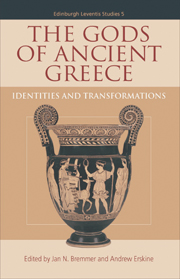Book contents
Epilogue
Published online by Cambridge University Press: 05 August 2013
Summary
This volume has sought to put the gods back into Greek religion, a realm from which modern scholarship with its emphasis on ritual and anthropology had rather paradoxically ousted them. When we direct our attention to the gods themselves, what is striking is the variety, both of gods and of ways of experiencing them. Which gods are important changes with place and time. Not every god makes it into everyone's pantheon; while some such as Zeus and Apollo are core members, others such as Ares and Dionysos might be included but might not. Gods may be promoted up the hierarchy in one region but not in others and they may, like Herakles, fluctuate in status between god and hero. Those gods best known to us in their Panhellenic guise may have been better known to the communities of the Greek world by their local character, which would have found expression in the traditions and folklore of the area. By studying this variety we can come closer to making sense of those who worshipped them. As Jan Bremmer puts it at the end of his chapter on Hephaistos, thinking about gods teaches us much about mortals.
Along with the variety of gods that permeated the Greek world was the multiplicity of ways they could be encountered. While the study of ritual certainly increases our understanding of Greek religion and society, it may also distract from the ancient experience of the divine. Gods could be present to the devotees of mystery cults, they could be called up by spells, they could become manifest through oracles, and they could be celebrated in festivals. Statues of gods brought the god before the people, sometimes in a very direct way as the statues were carried through the streets in sacred processions.
- Type
- Chapter
- Information
- The Gods of Ancient GreeceIdentities and Transformations, pp. 505 - 510Publisher: Edinburgh University PressPrint publication year: 2010



